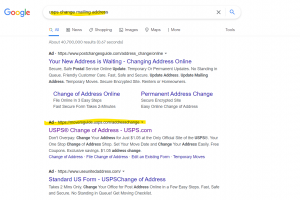26 Why SEO Matters
Now that you’ve learned a bit about how SEO works, you can see that it can be complicated and it takes some time to do well. So, you’re probably also wondering if it’s worth the effort!
It is absolutely worth the effort.
SEO Helps Users Find Your Writing
By optimizing your web writing for search engines, you are essentially ensuring that your writing will actually be read–that readers will find your writing and engage with it. Imagine all the different scenarios in which this might matter:

- Companies need potential customers to find their website and read about their services.
- Hospitals need patients to be able to quickly find their contact information.
- Journalists want readers to view their opinions on important topics.
- Bloggers need to build an audience in order to monetize their sites through sponsorships.
One important thing to keep in mind is that SEO helps push your website, blog, or web page higher in the rankings. So, for example, if your business appears on page 2 of the Google search rankings and your competitor’s business appears on page 1, well, as you can probably imagine, potential customers or clients are more likely to click on your competitor’s page and use their service or purchase their product.
Numerous studies of users’ search practices have shown that users rarely go beyond the first page of Google results to find what they are looking for, and that even on the first page of results, the difference between how often someone clicks on the first organic (brought about naturally through SEO practices versus paid practices) result versus the 10th can be up to ten times higher.
…And It’s Organic
It’s worth further exploring the difference between organic search results and paid. Paid search results are exactly what they sound like; companies pay Google or Bing to put their websites at the top of the results for certain keyword searches. On the other hand, organic search results refer to results that have been achieved without any payment.
One reason why SEO is important is because it’s considered organic. This means that SEO is an approach for making your website visible without spending money on advertisements!
I’ll share an embarrassing personal example. Preparing for a move in summer of 2021, I searched lazily in Google, using the phrase “usps change mailing address” because I needed to change my address. Notice the bold word “Ad” to the left of each URL in Figure 2? I didn’t. While the first result didn’t trick me, the second did because it said USPS with a trademark symbol. I failed to notice this was an ad.

Figure 2: SERP for the keyword phrase “usps change mailing address”
The end result? I signed up to use a company that charged me $85 to essentially contact USPS on my behalf to change my address. The website I selected was high in the results because it had been paid for, and while it wasn’t an illegal site, it was definitely misleading to me as a consumer.
If I had scrolled a bit further down to the first legitimate organic search, I would have found the real USPS site (and only spent $1.10!)

Figure 3: The Legitimate USPS Search Result
It’s not necessarily a poor practice to pay for rankings, nor is it always bad to click on paid results. Sometimes, companies have the money to spend on promoting themselves, and users will click. However, many casual web browsers trust organic search results more than paid results.

